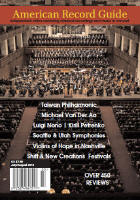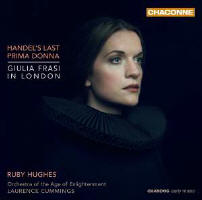Texte paru dans: / Appeared in: |
|
|
Outil de traduction ~ (Très approximatif) |
|
|
Reviewer: John
W. Barker
(This) disc presents samplings of Baroque arias, but in a format that has already produced a lively subcategory by itself: music written for specific singers of the day. Composers in the 18th Century were particularly eager to tailor their music to the talents and vocal qualities of their leading singers. So these “musical biographies” drawing on the repertoires of such singers tell us a lot about them and help us appreciate the music’s rationales.
In this case, we are dealing with a singer Handel worked with only at the very end of his career. Giulia Frasi was born and trained in Italy, but she moved to London in 1742 and pursued a really active career there for the next 31 years—until the year before she died in 1774. She sang roles in operas by composers other than Handel, and on that basis we might place this release in the Collections department.
But Handel is clearly the
commanding composer here. Frasi quickly attracted Handel’s attention both by
her excellent singing and by her determination to sing, and sing well, in
the English language. (By the time he encountered her he had given up
Italian opera and composed only English works.) In addition to using her in
revivals of his works, he had her create leading parts in the last five
oratorios: Solomon and Susanna (both 1749), Theodora (1750), The Choice of
Hercules (1751), and Jephtha (1752). From the works by other composers, we get arias from two Italian operas by emigre composer Vincenzo Ciampi (c.1719-62), Adriano in Siria and Il Trionfo di Camilla (both 1750). The other items are from English works—for revivals by Thomas Arne (1710-78) of his masque Alfred (1753) and his opera Artaxerxes (1762); the oratorios by John Christopher Smith (1712-95), Paradise Lost (1760) and Rebecca (1761); and from the masque Telemachus by Philip Hayes (1738-97).
In such a mix, the inferiority of these other composers to Handel is quickly evident: a bit of Vivaldian brio by Campi, and some individuality from Arne, against imitation Handel by Smith (the great man’s amanuensis and editor) and the nondescript Hayes. Still, it is interesting to have these otherwise ignored snippets brought to our attention in this context.
Ruby Hughes has a direct, clean, and unaffected soprano voice that, judging from descriptions, probably matches Frasi’s quite well. Her renditions can be beautiful and even touching, but she betrays the point of Frasi’s art in her weak diction—sometimes it is difficult to determine in what language she is singing, and in English she is blurry. Granted that diction can suffer in the high soprano range; still, no justice is done to Frasi’s determination to master English delivery.
The orchestral work under Cummings is exemplary—how can one fault an ensemble whose leader is named Margaret Faultless? The booklet gives extensive notes and full texts (with translations as needed). …but, for some reason, the volume level for the Frasi program is really low and must be boosted considerably.
| |
|
|
|
|
Cliquez l'un ou l'autre
bouton pour découvrir bien d'autres critiques de CD |
|




